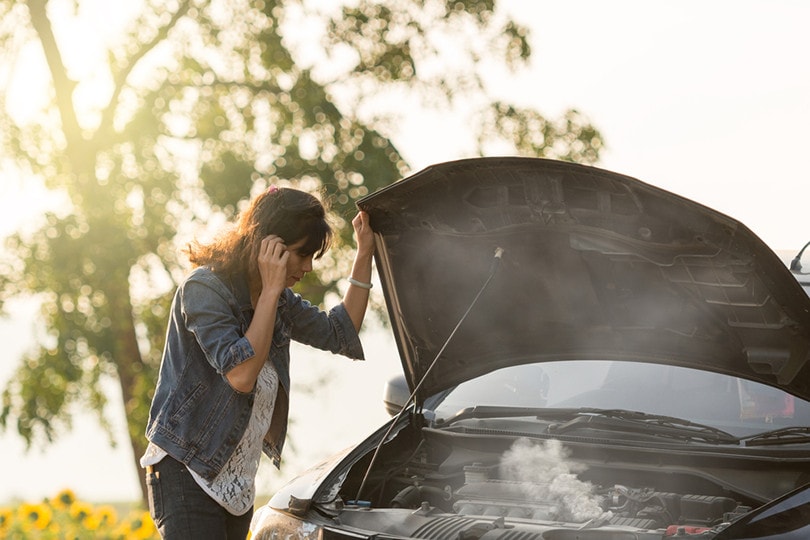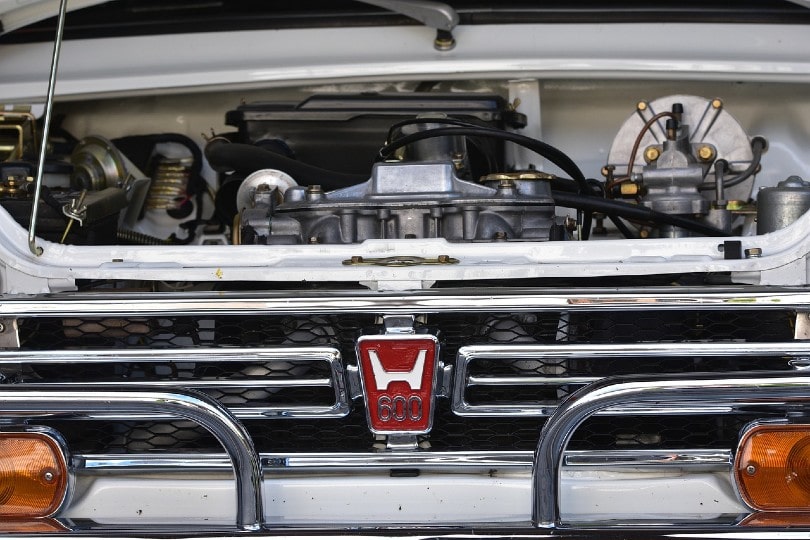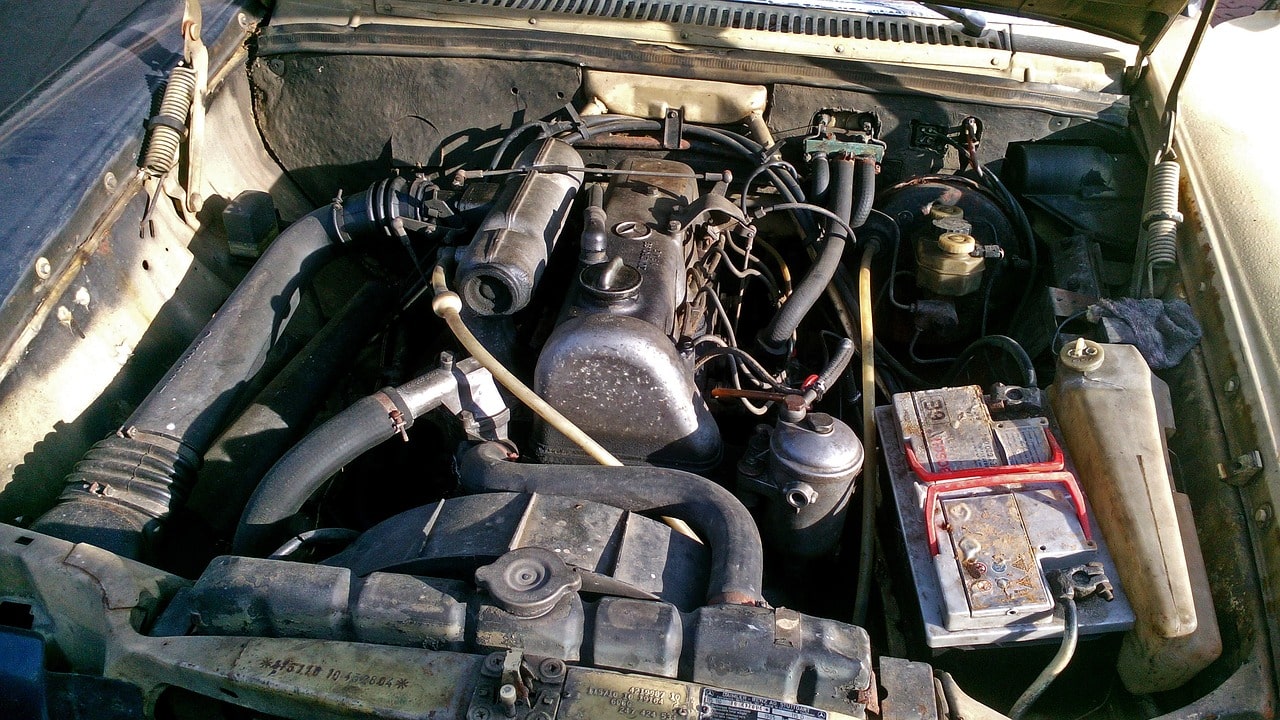How Long Can a Car Overheat Before Damage Occurs? What You Need To Know!
-
Kristin Hitchcock
- Last updated:

Not long! Most cars can only overheat for about 30 to 60 seconds before damage starts to occur. When a car overheats, it will quickly damage the engine. In only a minute, you may seize up your valves or even blow a piston if it gets hot enough.
Of course, it does matter how hot the car is getting. There is a difference between being just barely overheated and a hundred degrees hotter than the engine should be. If the gauge reaches the very end of the temperature range, then you have likely already done some damage. It takes nearly no time at all for cars to become damaged at this level of heat.
If your car is just barely overheating, though, you might be able to drive it for a couple more seconds before damage starts to occur. However, we are really talking about seconds here—not minutes. You cannot drive down the road when your car is overheating— pull over immediately to avoid any damage to your car.
How Many Times Can a Car Overheat Before Damage?

Most car engines will become damaged after they overheat just once. It only takes a few seconds of being too hot to damage a car’s engine, especially if it is at the end of the temperature gauge. Cars may be able to withstand barely overheating a few times, assuming that you stop driving every time the engine gets too hot.
No car is going to overheat at a “maximum” level more than one time. Instead, if your car gets that hot, the damage has already occurred and you likely need to visit a mechanic. Most cars will develop serious damage if they are driven at this point for more than a few seconds.
However, it does depend on how the gauges are set up and what temperature the warning lights start flashing at. Some cars are more sensitive than others, which will affect how much damage is done. If the warning light starts flashing sooner and you stop sooner, then the chance of damage is lower. However, if it is less sensitive or you don’t stop, then the damage is more likely.
Usually, your engine will blow a head gasket if you do not stop fast enough. However, other sorts of damage are possible in some situations. Either way, damage caused by an overheated engine is usually catastrophic, which means that you typically need to purchase a new engine altogether.
How Do I Know If My Engine is Damaged from Overheating?
If your engine became damaged when it overheated, you’ll know. Typically, the engine will seize up and stop working altogether—your car won’t turn on and the engine will not function. Overheating usually doesn’t cause small amounts of damage that are easy to miss. The damage is often catastrophic and pretty obvious. Usually, the head gasket will blow or you’ll lose a piston.
Of course, there are other sorts of damages that can occur as well. If you are worried, we recommend calling a professional to have a look.
In many cases, you’ll need a mechanic to look at your car anyway, since you’ll need to find out why your car was overheating, to begin with. If your mechanic notices any problems during this exam, they should let you know. Often, they will be able to tell if the damage was already there (and the cause of the problem) or if it was caused by overheating. Sometimes, it is difficult to tell.

Can You Drive a Car If it Overheats?
If your car overheats, you should not be driving it. Cars can not drive for more than a few seconds when they overheat. Therefore, it is easy to damage them unless you’re stopping every mile to let your engine cool down. Unless the mechanic is only a mile from your house, you should likely call a tow truck to have your car delivered to the mechanic, as opposed to driving it down there.
Of course, it does depend on how hot the engine is getting. A car that overheats slowly due to a slow coolant leak can probably be driven just fine for a few miles as long as you keep an eye on the temperature. However, a car that overheats as soon as you start driving typically will need a tow truck.
The truth of the matter is that you shouldn’t be driving a car when it is overheated. The second it becomes too hot; you need to stop.
Why Won’t My Car Start After It Overheated?
If your car will not start after it overheats there is likely catastrophic engine damage. Overheating causes warping in the cylinder head and engine block. When this occurs, it will cause a failure to start since your engine is not receiving any compression. Furthermore, it will cause valve damage and similar issues.
These issues are difficult to fix and in some cases, you may need a whole new engine, which is very costly. Overheated engines are usually not drivable again.
If your car is not starting after it overheats, then the odds aren’t good that the repair will be cheap and straightforward. Of course, you’ll need to visit a mechanic to make sure.
- Related Read: How Long Can a Car Idle? What You Need To Know!
Final Thoughts
If you take one thing from this article, it’s that you should stop driving as soon as your car starts to overheat. If you drive for only a few seconds after your car gets too hot, you risk permanently damaging your engine.
However, the amount of damage does depend on a variety of factors. For one, if you stop as soon as the engine begins to overheat, your chance of serious damage is on the lower end. However, if you waited for the warning lights to come on or for the gauge to reach the maximum temperature, then the chance of damage is much higher.
Featured Image Credit: worawit_j, Shutterstock
Contents
